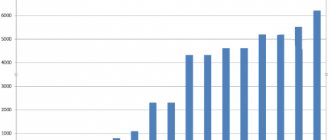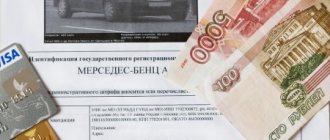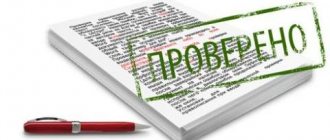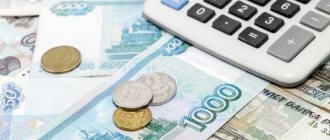Legal encyclopedia of MIP online - » Tax law » General provisions » Types of taxes and fees in the Russian Federation. Powers of state authorities and municipal bodies to establish taxes and fees
Get an expert opinion on the establishment of taxes and fees in two clicks
Types of taxes and fees in the Russian Federation include 3 categories.
Powers of state and municipal authorities to establish mandatory payments
The current legislation establishes the basic principle by which acts establishing the obligation to pay taxes are adopted. This is possible only on the basis of relevant decisions of representative bodies of municipal and state authorities.
There are 2 main reasons for this. The first is political and lies in the fact that members of representative bodies receive a mandate of trust from citizens in elections. The second reason is the importance of ensuring a simple and transparent tax system, which would be hindered by a large number of departmental acts establishing these payments.
In contrast to the general hierarchy of acts, which provides for the subordination of regional acts to federal ones, and municipal acts to regional ones, the Tax Code introduces a 2-tier structure.
A special feature of such a system is that the basic parameters of payments are determined at the federal level, and the rest - at the regional and local level.
At the same time, the legislation of the constituent entities of the Russian Federation and decisions of municipalities on tax issues do not provide for the subordination of the latter to the former.
What taxes does a person pay in Russia?
08/08/2018 1 511 4 Reading time: 12 min. Rating:
Author
: Konstantin Bely
Attention, a very interesting topic! In this article, I propose to calculate and discuss what taxes a person pays in Russia . If you've never thought about this question, the data may surprise you. We will consider how much taxes a person who is not an individual entrepreneur pays , an ordinary ordinary worker who works “for an uncle” and receives a salary - these are the majority of people in the Russian Federation.
So, for clarity, I will calculate what taxes a person pays in Russia with a conditional income of 1000 rubles. Let's start in order from the very beginning.
Social contributions - 30%. These contributions are officially paid by the employer from the employee’s accrued salary. However, they indirectly reduce the amount that the employee receives in hand.
Simply put, let’s say an employer is ready to allocate 1,000 rubles to pay an employee. But he knows that 30% of insurance premiums must be paid from the payroll, including:
- For pension insurance - 22%;
- For health insurance - 5.1%;
- For social insurance - 2.9%.
This rate is valid until 2021, and may be revised later.
Therefore, the amount that is allocated to an employee from 1000 rubles is 700 rubles , the remaining 30% immediately goes to the budget for social contributions.
Personal income tax - 13%. Next, personal income tax (NDFL) is paid. This is directly from the amount that is allocated to the employee (in our example - 700 rubles), but the employer acts as a tax agent and makes this payment.
The personal income tax rate in most cases is 13%, but can be, for example, 30% if the employee is a non-resident or works part-time.
After paying 13% of our 700 rubles, there are already 609 rubles .
VAT - 20% (from 2021). Having received their 609 rubles out of a possible 1000 (61%), a person begins to spend them. And with each such expenditure, without thinking about it, he pays indirect taxes, primarily value added tax (VAT). Right now, the VAT rate is still 18%, but a law has already been signed to increase VAT to 20%, this increase will occur in 2021, so I will immediately calculate at the new rate.
With an amount of 609 rubles, a person will be able to buy goods and services with a real value of 507.5 rubles and at the same time pay VAT of 20% - 101.5 rubles. That is, he actually uses only 507.5 rubles or about 51% of his honestly earned 1000.
Thus, only basic taxes in Russia leave approximately half of the money earned for a person to actually use.
But if you think that’s all, I hasten to disappoint you. Not everyone! Let's go further and consider what other taxes a person pays in Russia after paying these basic ones.
Excise taxes. Certain goods in the Russian Federation are subject to excise duty. These are alcoholic products, tobacco products, petroleum products, automobile fuel, alcohol-containing products, cars and motorcycles.
An accurate calculation of the excise tax paid by an individual resident of Russia in percentage terms will be difficult and virtually impossible. Because, firstly, excise tax rates are set not as a percentage of the cost, but in monetary terms per volume of production. Secondly, each person consumes a different amount of excisable goods.
Even if we imagine that a person leads a healthy lifestyle, does not use tobacco or alcohol, but still has a car, he definitely buys fuel. And as a percentage, the excise tax on fuel reaches 65% of the cost!
That is, if a person, conditionally, spends his earned 1000 rubles of income, of which he has only 507.5 rubles left, on such gasoline, then in fact he will buy gasoline for only 199.92 rubles , and will pay 307.58 rubles in excise duty . In this case, only 20% (!) of the money earned remains at his disposal, and the rest goes to taxes.
And even if a person does not own a car and does not buy fuel, he indirectly pays this excise tax when purchasing almost any product or service. Because the cost calculation includes the delivery price, the delivery price includes the cost of fuel, and the cost of fuel includes excise tax.
If we calculate very roughly, then let’s say that delivery is 20% of the price of the product, fuel is 70% of the delivery price, excise duty is 65% of the fuel price. In this case, the indirect excise tax that a person pays when buying a product is about 9.1% of the cost of the product. And if this amount is subtracted from his remaining 50% of earnings, 41% will remain (410 rubles out of 1000).
If a person uses a car himself, regularly buying fuel for, say, 10% of his budget, he pays another 6.5% in the form of excise tax. And he still has 34.5%, that is, 345 rubles out of a thousand earned.
If he also smokes and at least sometimes drinks alcohol, the “net” amount remaining after taxes will be even less!
But that's not all. The Tax Code of the Russian Federation provides for the payment of various types of property taxes.
Property tax. The rates of this tax are different, they depend on the region, area and cadastral value of the property. Therefore, further calculations will also be approximate.
Let's take an apartment with an average area of 50 square meters. m. According to the law, 20 sq. m. are not taxed, you will have to pay tax on the remaining 30. The tax rate is 0.1%. If an apartment costs 3 million rubles, its owner must pay (3,000,000*30/50)*0.001 = 1,800 rubles per year.
If you spread this amount over 12 months, you get 150 rubles per month. If a person earns the average salary - 30,000 rubles a month in hand, then 150 rubles is half a percent of his income. Or another 5 rubles for every thousand earned.
After paying the property tax, he already has 340 rubles or 34% of his income.
If a person owns more expensive real estate, or several real estate objects (even a summer cottage, a garage), the amount of taxes increases, and the available “net” amount decreases even more.
Transport tax. Here, too, the rates are different and the calculation can only be approximate. The amount of transport tax depends on the engine power and region (each has its own rates, ranging from 5 to 150 rubles per 1 horsepower).
Let's take for example a car with a 150 hp engine. and tax rate - 30 rubles per 1 hp. In this case, the amount of transport tax will be 4,500 rubles per year. Or 375 rubles per month. Or 12.5 rubles for every thousand earned.
In our example, we subtract this tax, after which 327.5 rubles or 32.8% of earned income remains. This is what ultimately remains of our original thousand.
Thus, the average resident of Russia with an average salary, who owns one small apartment and an inexpensive car, and does not have bad habits, pays in total, directly and indirectly, about 70% of taxes on his earnings! And only 30% remains at his personal disposal.
Even if we take into account that the calculations are approximate, this is a very large amount. And if you get even deeper into the weeds, and take into account other, smaller taxes (on pets, etc.), taxes on the possible sale of property, as well as many mandatory contributions (for example, for major repairs, compulsory motor liability insurance, technical inspection, for the maintenance of gas equipment and etc.), it turns out that a person has only a few percent of what he has earned at his disposal.
So, if someone thinks that taxes in Russia are among the lowest in the world (and this is exactly the headline I saw in one of the leading media, which prompted me to write this article), then I believe that he is mistaken. Real taxes in Russia are among the highest in the world, as you can see, reaching 60-70% of income and even more, they are simply heavily veiled and may not be visible to a person far from finance. And with all this, they are still raised.
I would be glad to hear your opinion on this issue in the comments. Subscribe to the official pages of the site on social networks and stay tuned for updates. See you again on Financial Genius - a site that will increase your level of financial literacy.
Estimate:
Federal taxes and fees
Mandatory payments, the payment of which must be made to the center's budget, are established in Art. 13 NK. These include:
- VAT;
- all excise taxes provided for in the Russian Federation;
- personal income tax;
- corporate income tax;
- MET;
- water tax;
- fees associated with the use of wildlife objects, as well as objects of aquatic biological resources;
- all types of state fees.
All these payments are classified at the national level due to the fact that decisions on their establishment are related to the implementation of federal fiscal and economic policies. It is assumed that centralization will allow achieving the most effective management in these areas.
The main principle of this part of the tax system is the uniformity of rules throughout the state. Subjects residing in the territory of any region or municipality in Russia make mandatory payments, the main elements of which (rate, object of taxation, billing period, base, calculation procedure, as well as payment and its terms) have identical characteristics.
There is one exception to this rule. They concern a system of special tax regimes for persons meeting certain criteria. Their list is given in Art. 18 NK. Such regimes include the single agricultural tax, simplified tax system, UTII, patents, as well as production sharing agreements.
Powers of federal authorities
Despite the fact that the basis of the tax system in Russia involves division by level, the center has very broad powers. In addition to establishing all elements of federal payments, he is given the right to adopt basic rules regarding taxes and fees at other levels.
The obligatory basis for the emergence of obligations for their payment is the inclusion of the latter in the tax code. The basic document defines some of the mandatory elements of taxes and fees (all of which are not within the powers of regional and local authorities).
All laws adopted by the State Duma must be in the nature of amendments to the Tax Code.
Powers of regional and local authorities
Regional parliaments (dumas, legislative assemblies, etc.) are given the right to adopt laws on tax issues within the framework provided by the Tax Code.
As a general rule, representative bodies in the constituent entities of the Russian Federation have the right to make decisions on tax rates, as well as the procedure and timing for their inclusion in the budget, if such provisions were not established by the Tax Code. In addition, regional parliaments may be given the right to establish benefits and features of determining the tax base. At the same time, the framework set by the Tax Code must be observed.
If a constituent entity of the Russian Federation is not divided into municipalities (Moscow, St. Petersburg and Sevastopol), issues related to local taxes are resolved by regional representative bodies.
Decisions on the establishment of local taxes and fees are made by the representative body of the municipality, based on the requirements of the Tax Code. At this level, issues similar to those for regional taxes and fees must be resolved.
Author of the article
Regional taxes and fees
The list of taxes assigned to the regional level of the system includes corporate income tax, transport tax, and gambling tax. All these payments are distinguished by the fact that their individual elements reflect the specifics of the constituent entities of the Russian Federation.
A good example is the gambling tax. The current law allows such activities only in certain regions. For this reason, there is no need to establish tax rules for such persons in the rest of the country.
Transport tax is also related to the specifics of regions. They are given the right to independently decide on the quantitative indicators of taxation. This is explained by the different density of traffic flow, as well as the degree of development of alternative means of transportation in the constituent entities of the Russian Federation.
Local taxes and fees
Payments established by decisions of authorities at the local level include trade tax, land tax, and property tax for individuals.
As in the case of regional taxes and fees, the criterion for transferring them to the local level is the proximity of the objects of taxation. The economic situation of each municipality may differ significantly.
In particular, the criterion for the amount of land tax and property tax for individuals is the cadastral value of plots and real estate. It is related to the market price. Therefore, it is believed that local authorities will make decisions that are appropriate to the situation much more accurately and quickly. And if the corresponding powers are left to the state authorities, then the regulatory process will become significantly more complicated.









